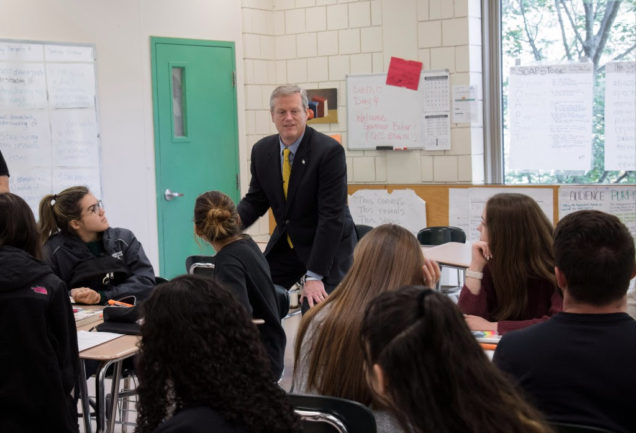October 27, 2017
|
Picture of the Week:
On October 17, 2017, Governor Charlie Baker met with students and teachers atMarlborough High School, where nearly 100 students are enrolled in college-level courses. During the past few weeks, Governor Baker and Lieutenant Governor Karyn Polito visited a handful of early college programs across the state to highlight the Administration’s commitment to expanding early college opportunities.

The ABCs of Success in High School and Beyond:
This interactive data story provides information from ESE for parents, community members, and educators on how attendance, behavior, and course performance in Massachusetts high schools affects post-secondary outcomes. See it at: http://www.mass.gov/SuccessABCs.
Springfield Principal Honored:
The U.S. Department of Education recently recognized Kristen Hughes, principal of White Street School in Springfield, as one of eight recipients of the2017 Terrel H. Bell Awards for Outstanding School Leadership. The winners are chosen from the 2017 cohort of National Blue Ribbon Schools and will be honored during an awards ceremony in Washington, D.C. next month. Congratulations, Ms. Hughes!
Graduation Requirements for High School Students from Puerto Rico:
The Department has received inquiries about how students arriving from Puerto Rico should meet the Competency Determination that is required to receive a Massachusetts high school diploma. The Department is working with the Puerto Rico Department of Education to determine when records will be available for incoming students. In the meantime, districts should plan to administer the MCAS retest in November or March to students transferring from Puerto Rico who are in grades 11 and 12. The Department expects to issue additional guidance later this fall.
Online Course for Early Childhood Educators:
Early childhood educators are encouraged to consider registering for the facilitated, online version of an introductory course on the Massachusetts Standards for Preschool and Kindergarten Social and Emotional Learning and Approaches to Play and Learning. Caroline Blackman, ESE’s approved online course facilitator, will offer the course from November 6-December 10. The Department of Early Education and Care and ESE developed the course collaboratively. The fee is $100, and the course is limited to 20 participants. For registration and further information, contact Caroline Blackman.
ESSA Changes Related to the “Highly Qualified” Designation and Parental Notifications:
The Every Student Succeeds Act has eliminated federal requirements that educators be classified as “Highly Qualified.” As a result, ESE is no longer collecting “Highly Qualified” data about teachers in the Education Personnel Information Management System (EPIMS). This does not change the Massachusetts licensure regulation 7.15(9)(a) that district educators must be licensed and that a licensed educator “may be employed for a maximum of 20 percent of his/her time in a role and/or at a level for which s/he does not hold a license.” However, ESSA requires states and districts to identify teachers who are teaching in areas for which they do not hold a license. The Department will be developing guidance about this in the coming months to help districts determine which teachers are “in-field” or “out-of-field” for the courses that they teach.
Two additional related requirements from ESSA:
- At the beginning of each school year, districts must notify parents that they can request “right-to-know” information about the professional qualifications of teachers and paraprofessionals. This sample district and school report card cover letter references that right.
- Schools that receive Title I funding must provide each individual parents timely notice if a child has been assigned to or has been taught for four or more consecutive weeks by a teacher who does not meet state licensure requirements at the grade level and subject area in which they have been assigned. This sample letter can help districts meet that notification requirement
Digital Connections Partnership Schools Grants Available for Wi-Fi:
The Department is accepting applications from districts seeking to upgrade their wireless networks. To see if a particular district has been preliminarily targeted for an upgrade, consult this list. Even districts that are not prepared to apply for the grant this year are encouraged to complete an application, because the information will be used to inform ESE’s budget request for FY19 funding.
Recent Changes to the Educator Licensure and Preparation Program Approval Regulations:
In June, the Board of Elementary and Secondary Education approved a set of changes to the regulations for Educator Licensure and Preparation Program Approval (603 CMR 7.00). The Department is seeking feedback on the following topics:
- Subject Matter Knowledge Guidelines – These detail the content topics for each license, and sponsoring organizations use the guidelines to design their teacher preparation programs. The Department uses the guidelines when it reviews programs seeking state approval and as the basis for the Massachusetts Tests for Educator Licensure (MTEL). Public comment will be open until November 17.
- Foreign Teacher Panel Guidelines – The Board approved a formal process in which ESE can license educators who were prepared outside the United States via a panel review rather than having to make a special appeal to the commissioner. The guidelines outline the types of candidates who could be licensed via this process and provide a checklist of the documents they will need. Public comment will be open until November 3.
- Provisional Validity Period Guidelines – The Provisional license, formerly called a Preliminary license, will be valid for five years of employment as of July 1, 2019, regardless of how many different fields and grade levels of Provisional licenses an educator possesses. The guidelines provide different scenarios of educators who hold multiple Provisional licenses and how many years of employment they may have remaining under their license when the change takes effect. Public comment will be open until December 8.
- Pre-Practicum Guidelines: The Department is developing guidelines on the pre-practicum component of educator preparation and has released a set of policy proposals.Public comment will be open until October 31.
|
|